专升本英语语法精品讲义
副词-专升本英语语法详细讲解课件

Have you been there already?
③做“还”讲时, yet用于否定句, still用于肯定 句、疑问句, 表示“依然、继续”, 有时也用于 否定句。
The rain hasn’t stopped yet.
It’s still raining now.
四.同源副词
A)
5.I used to smoke _______ but I gave it up three years ago.
A) seriously B) heavily C) badly D) severely
B)
6.The organization had broken no rules, but _____ had it acted responsibly. A) neither B) so
A) essentially B) completely C) necessarily D) remarkably
A)
3.Our journey was slow because the train stopped ________ at different villages.
A) unceasingly B) gradually C) continuously D) continually
4.so, neither与nor
三个词都能表示后者和前者情况相似。 so用于肯定句, neither和nor用于否定 句。
①He likes skating. So do I. ②The first one wasn't good, and
neither/nor was the second.
2. late, lately late意思是“晚”, lately意思为“近来” You have come too late. Have you see him lately?
专升本英语语法讲义
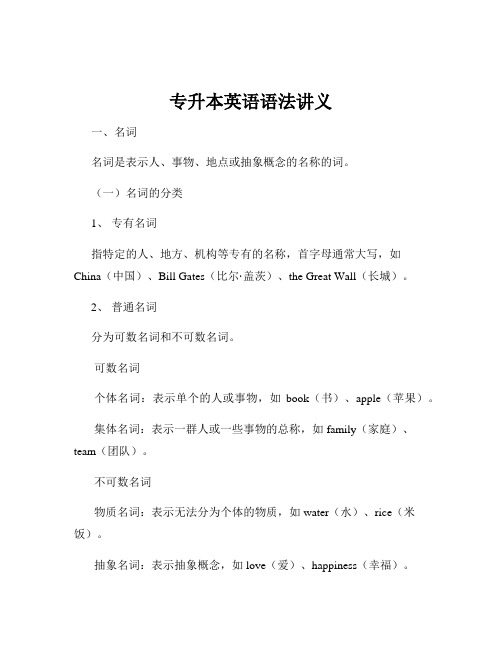
专升本英语语法讲义一、名词名词是表示人、事物、地点或抽象概念的名称的词。
(一)名词的分类1、专有名词指特定的人、地方、机构等专有的名称,首字母通常大写,如China(中国)、Bill Gates(比尔·盖茨)、the Great Wall(长城)。
2、普通名词分为可数名词和不可数名词。
可数名词个体名词:表示单个的人或事物,如book(书)、apple(苹果)。
集体名词:表示一群人或一些事物的总称,如 family(家庭)、team(团队)。
不可数名词物质名词:表示无法分为个体的物质,如 water(水)、rice(米饭)。
抽象名词:表示抽象概念,如 love(爱)、happiness(幸福)。
(二)名词的数1、可数名词的复数形式一般在名词后加 s,如 books,apples。
以 s,x,ch,sh 结尾的名词,加 es,如 buses,boxes,watches,dishes。
以辅音字母+ y 结尾的名词,把 y 变为 i 再加 es,如 city cities,baby babies。
但以元音字母+ y 结尾的名词,直接加 s,如 boy boys,day days。
以 f 或 fe 结尾的名词,把 f 或 fe 变为 v 再加 es,如 knife knives,leaf leaves。
但有些词直接加 s,如 roof roofs,chief chiefs。
不规则变化,如 man men,woman women,child children,foot feet,tooth teeth 等。
2、不可数名词的量化不可数名词要表示数量,需要用量词短语,如 a piece of paper(一张纸),a cup of coffee(一杯咖啡),two bottles of water(两瓶水)。
(三)名词的所有格1、表示有生命的名词的所有格一般在名词后加's,如 Tom's book(汤姆的书)。
福建专升本英语语法讲义
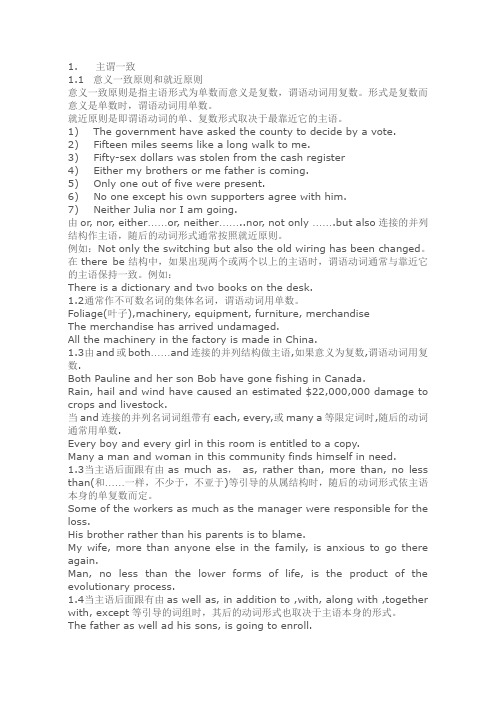
1.主谓一致1.1意义一致原则和就近原则意义一致原则是指主语形式为单数而意义是复数,谓语动词用复数。
形式是复数而意义是单数时,谓语动词用单数。
就近原则是即谓语动词的单、复数形式取决于最靠近它的主语。
1)The government have asked the county to decide by a vote.2)Fifteen miles seems like a long walk to me.3)Fifty-sex dollars was stolen from the cash register4)Either my brothers or me father is coming.5)Only one out of five were present.6)No one except his own supporters agree with him.7)Neither Julia nor I am going.由or, nor, either……or, neither……..nor, not only …….but also连接的并列结构作主语,随后的动词形式通常按照就近原则。
例如:Not only the switching but also the old wiring has been changed。
在there be结构中,如果出现两个或两个以上的主语时,谓语动词通常与靠近它的主语保持一致。
例如:There is a dictionary and two books on the desk.1.2通常作不可数名词的集体名词,谓语动词用单数。
Foliage(叶子),machinery, equipment, furniture, merchandiseThe merchandise has arrived undamaged.All the machinery in the factory is made in China.1.3由and或both……and连接的并列结构做主语,如果意义为复数,谓语动词用复数.Both Pauline and her son Bob have gone fishing in Canada.Rain, hail and wind have caused an estimated $22,000,000 damage to crops and livestock.当and连接的并列名词词组带有each, every,或many a等限定词时,随后的动词通常用单数.Every boy and every girl in this room is entitled to a copy.Many a man and woman in this community finds himself in need.1.3当主语后面跟有由as much as,as, rather than, more than, no less than(和……一样,不少于,不亚于)等引导的从属结构时,随后的动词形式依主语本身的单复数而定。
专升本英语语法精品讲义ppt课件

9.It was a meeting________importance I did not realize at the time. A.which B.at which C.its D.whose 解析:定语从句修饰meeting,引导词whose在定语从句中
语法专练
1.I have seen the film,________leading actor is my
favourite. A.its B.that C.whose D.which 解析:定语从句修饰film,引导词在定语从句中作 leading actor的定语,表所属关系。 答案:C 2.The girl________everybody had thought could win a gold
的关系,whom作of的宾语。 答案:C
定语从句(二) 1.whom,which在定语从句中可作介词的宾语,这样的介词一
般放在whom,which之前也可放在原来的位置上。that也可作 介词宾语,但介词不能放在that前,只能放在原位置上;含有 介词的固定词组,介词也只能放在原位置上。 This is the nurse to whom Tom spoke just now.=This is the nurse whom Tom spoke to just now. 这就是那个Tom刚才跟她谈话的护士。 The child whom you take care of is ill.你照看的那小孩病了。
码”。后面是倒装句。 答案:C
7.I don’t like the way________he spoke to me. A.what B.by which C.by that D./ 解析:定语从句修饰way,引导词作状语时可用in which/that/不填。 答案:D
介词 专升本英语语法详细讲解课件

Apart from a few slight faults, he has done good work.除了 The orphan has no one to take care of him apart from my uncle. There were three others present at the meeting apart from Mr. Jackson.
4. 表示关于,至于的介词 In regard to, with regard to, regarding, as regards, concerning, respecting, touching, with respect to, in respect of, with reference to, in the matter of..
时间地点原因关于方法价格特性进行等介词用法要点介词和介词短语的惯用法难点企业文化就是传统氛围构成的公司文化它意味着公司的价值观诸如进取守势或是灵活这些价值观构成公司员工活力意见和行为的规范
Байду номын сангаас介词
1.分类 2. 位置 3. 介词的宾语 4. 介词的语法功能 5.时间、地点、原因、关于、方法、价格、 特性、进行等介词用法要点 6. 介词和介词短语的惯用法难点
4). Above & below (不接触,也不垂直) The plane is flying above us. The sun has sunk below the horizon. 5). Beneath=below, under, underneath
3. 表示原因或理由的介词 The old man died of liver trouble. She is sick of drinking too much. She died from hunger or poverty. He trembled for fear. The man bent with age.
专升本英语语法精讲课件

专升本英语语法精讲课件教学内容:本节课的教学内容选自《专升本英语语法》教材,主要涵盖第五章动词的时态和语态。
本章内容是英语语法学习的重要部分,包括一般现在时、一般过去时、一般将来时、现在进行时、过去进行时、现在完成时、过去完成时、被动语态和主动语态等。
通过本章的学习,使学生掌握动词时态和语态的用法,能够正确表达时间、动作和状态等概念。
教学目标:1. 学生能够掌握动词的时态和语态的构成和用法;2. 学生能够正确运用动词的时态和语态表达时间、动作和状态等概念;3. 学生能够通过动词的时态和语态的运用,提高英语听说读写的能力。
教学难点与重点:重点:动词的时态和语态的构成和用法。
难点:一般将来时、过去进行时、现在完成时、过去完成时和被动语态的用法。
教具与学具准备:教具:多媒体课件、黑板、粉笔。
学具:教材、练习册、笔记本。
教学过程:一、情景引入(5分钟)教师通过多媒体课件展示一些日常生活中的照片,引导学生用英语描述照片中的动作和状态,从而引出动词的时态和语态的概念。
二、知识讲解(15分钟)教师在黑板上用粉笔写出动词的时态和语态的构成和用法,一边讲解一边示例,让学生直观地理解一般现在时、一般过去时、一般将来时、现在进行时、过去进行时、现在完成时、过去完成时、被动语态和主动语态的用法。
三、例题讲解(15分钟)教师通过多媒体课件展示一些例题,让学生观察并分析例题中动词的时态和语态的用法,然后给出答案并解释原因。
四、随堂练习(15分钟)教师发放练习册,让学生完成练习题,然后教师挑选一些学生的答案进行讲评和纠正。
五、课堂小结(5分钟)六、板书设计七、作业设计1. 请用一般现在时、一般过去时、一般将来时、现在进行时、过去进行时、现在完成时、过去完成时、被动语态和主动语态各写一个句子,并解释其用法。
答案:一般现在时:I like apples.(我喜欢苹果。
)一般过去时:I visited the museum yesterday.(我昨天参观了博物馆。
专升本英语--语法讲义2

语法: 句子的种类(一)按使用目的可分为陈述句、疑问句、祈使句和感叹句。
1.陈述句(Declarativ.Sentences):说明一个事实或陈述一种看法。
Ligh.travel.faste.tha.sound.光比声速度快。
(说明事实)Th.fil.i.rathe.boring.这部电影很乏味。
(说明看法)2.疑问句(Interrogativ.Sentences):提出问题。
有以下四种:a.一般疑问句(Genera.Questions):Ca.yo.finis.th.wor.i.time.你能按时完成工作吗?b.特殊疑问句(.Questions..Questions):Wher.d.yo.live?你住那儿?Ho.d.yo.kno.that.你怎么知道那件事?c.选择疑问句(Alternativ.Questions):D.yo.wan.te.o.coffee.你是要茶还是要咖啡?d.反意疑问句(T ag-Questions):H.doesn'.kno.her.doe.he?他不认识她,对不对?3.祈使句(Imperativ.Sentences):提出请求,建议或发出命令,例如:Si.down.please.请坐。
Don'.b.nervous!别紧张!4.感叹句(Exclamator.Sentences):表示说话人惊奇、喜悦、愤怒等情绪,例如:Wha.goo.new.i.is!多好的消息啊!(二)句子按其结构可以分为以下三类:1.简单句(Simpl.Sentences):只包含一个主谓结构句子叫简单句,例如:Sh.i.fon.o.collectin.stamps.她喜欢集邮。
(主)(谓)2.并列句(Compoun.Sentences):包含两个或两个以上主谓结构的句子叫并列句,句与句之间通常用并列连词或分号来连接,例如:Th.foo.wa.good.bu.h.ha.littl.appetite.(主)(谓)(主)(谓)食物很精美,但他却没什么胃口。
专升本英语语法知识点精讲
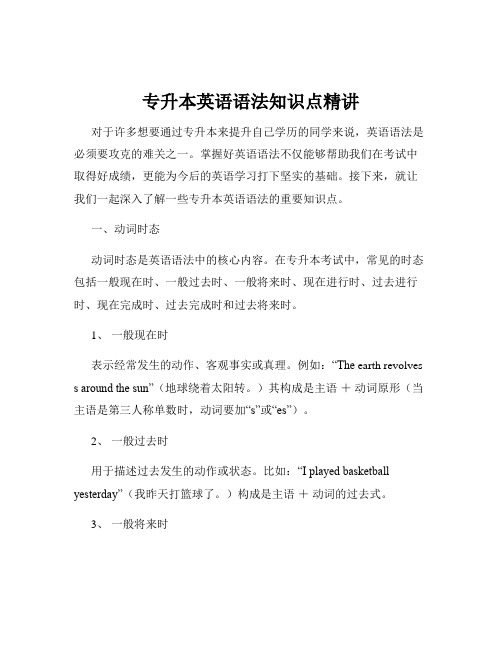
专升本英语语法知识点精讲对于许多想要通过专升本来提升自己学历的同学来说,英语语法是必须要攻克的难关之一。
掌握好英语语法不仅能够帮助我们在考试中取得好成绩,更能为今后的英语学习打下坚实的基础。
接下来,就让我们一起深入了解一些专升本英语语法的重要知识点。
一、动词时态动词时态是英语语法中的核心内容。
在专升本考试中,常见的时态包括一般现在时、一般过去时、一般将来时、现在进行时、过去进行时、现在完成时、过去完成时和过去将来时。
1、一般现在时表示经常发生的动作、客观事实或真理。
例如:“The earth revolves s around the sun”(地球绕着太阳转。
)其构成是主语+动词原形(当主语是第三人称单数时,动词要加“s”或“es”)。
2、一般过去时用于描述过去发生的动作或状态。
比如:“I played basketball yesterday”(我昨天打篮球了。
)构成是主语+动词的过去式。
3、一般将来时表示将来要发生的动作,常见的表达有“will +动词原形”和“be going to +动词原形”。
例如:“I will go to Beijing next week” (我下周要去北京。
)4、现在进行时表示正在进行的动作,结构为“be +现在分词”。
如:“She is reading a book now”(她现在正在读书。
)5、过去进行时强调过去某个时刻正在进行的动作,“was/were +现在分词”是其构成形式。
像:“I was watching TV at 8 o'clock last night” (昨晚八点我正在看电视。
)6、现在完成时表示过去发生的动作对现在造成的影响或结果,或者从过去开始一直持续到现在的动作。
“have/has +过去分词”为其结构。
例如:“I have learned English for five years”(我学英语已经五年了。
)7、过去完成时在过去某个时间点之前已经完成的动作,由“had +过去分词”构成。
2023年山东省专升本考试英语科目必考语法精讲
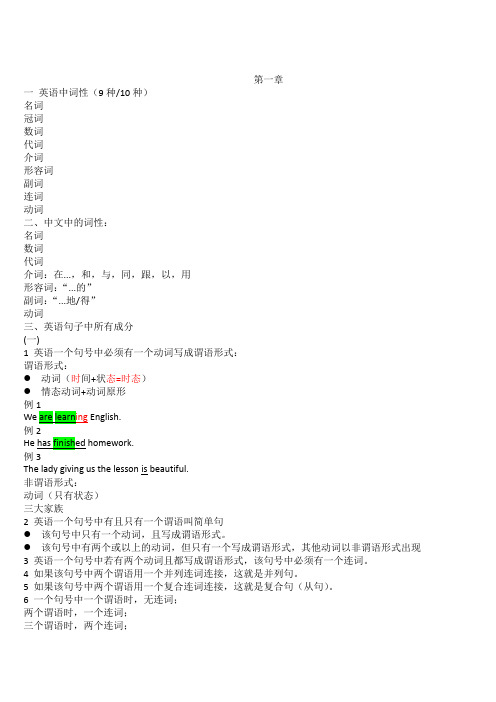
第一章一英语中词性(9种/10种)名词冠词数词代词介词形容词副词连词动词二、中文中的词性:名词数词代词介词:在...,和,与,同,跟,以,用形容词:“...的”副词:“...地/得”动词三、英语句子中所有成分(一)1 英语一个句号中必须有一个动词写成谓语形式:谓语形式:●动词(时间+状态=时态)●情态动词+动词原形例例例The lady giving us the lesson is beautiful.非谓语形式:动词(只有状态)三大家族2 英语一个句号中有且只有一个谓语叫简单句●该句号中只有一个动词,且写成谓语形式。
●该句号中有两个或以上的动词,但只有一个写成谓语形式,其他动词以非谓语形式出现3 英语一个句号中若有两个动词且都写成谓语形式,该句号中必须有一个连词。
4 如果该句号中两个谓语用一个并列连词连接,这就是并列句。
5 如果该句号中两个谓语用一个复合连词连接,这就是复合句(从句)。
6 一个句号中一个谓语时,无连词;两个谓语时,一个连词;三个谓语时,两个连词;To find more information, __go___ to the website.go/ going/ to go/ gone(二)一个简单句的所有成分:主干成分谓语主语宾语(动词后的承受者,或介词后的承受者)辅助成分(第二节课)一二三、英语句子如果是简单句,所有成分:(一)主干成分:①谓语:动词,系动词②主语:③宾语:④表语:(二)辅助成分①定语:在名词前修饰名词的成分②后置定语:在名词后修饰名词的成分③宾语补足语:“动词+宾语”或“介词+宾语”,此时语义不完整,需要补充说明宾语,这就是宾语补足语④主语补足语:主语+系动词+表语,此时语义不完整,需要补充说明主语,这就是主语补足语。
⑤同位语:进一步解释说明前面的名词或代词。
⑥状语:修饰动词,或形容词,或副词,表示一种程度。
第二章英语所有的词性一、动词v.(一)动词的种类:1.实义动词注意:所有实义动词都有动作的发出者,被称为:执行者。
专升本英语语法复习讲义

英语语法一非谓语动词1. 非谓语动词,又称为非限定动词,有三种形式:不定式、v-ing 分词、v-ed 分词。
它们有如下特点:1.)不能作谓语或不能独立作谓语;2.)没有人称和数的变化;3.)仍然具有动词的一些特性,有时态,语态(没有语气),可以有自己的宾语、状语。
2. 非谓语动词的逻辑主语一般来说就是句子的主语。
如果非谓语动词和它的逻辑主语之间有逻辑上的主谓关系时,就用v-ing分词,如果非谓语动词和它的逻辑主语之间有动宾关系时,我们就使用v-ed,eg. ________(see) from the top of the mountain, you can have a good view of the whole city.________(see) from the top of the mountain, the city looks very beautiful.3 非谓语动词的否定式,not 总是放在最前面。
eg . not to know how to do itnot knowing where he is(一)不定式1.构成由to + 动词原形构成,有时也可以省去to. 否定式由not + 不定式构成。
2用法(1)作主语、宾语、表语、定语、状语和宾语补足语。
eg. To make a plan for our future is very important.(主语)How to get enough capital is still a problem (主语)I like to go out for a walk in such warm sunshine.(宾语)She can‟t decide what to do. (宾语)Perhaps this would be a good chance to go to Hainan.(定语)Could you get me something to drink? (定语)Her wish is to marry an honest young man. (表语)His plan is to spend a few days in the mountain. (表语)In 1918,he went to Japan to study medical science. (状语,表目的)A few years later, she came home to find that her hometown had greatly changed.(状语,表结果)Would you like us to go with you? (宾补)Did you notice him leave the house? (宾补)He was asked to make a speech at the meeting (主补)They were made to work day and night. (主补)(2)作主语时,为了使句子保持平衡,往往有it 作形式主语,而把不定式放在谓语动词后面。
云南普通专升本公共课(公共英语)语法精讲(七):强调句、倒装句和反义疑问句

云南普通专升本公共课(公共英语)语法精讲(七):强调句、倒装句和反义疑问句学习目的:1. 掌握常见的强调方法,特别是强调句型。
2. 掌握部分倒装和全部倒装的用法。
3. 熟练运用常考的反义疑问句。
一.强调结构在句子中,有时为了突出句子的某些成分以加强语气,增强感情色彩或加强对比,需要改变句子结构来实现。
以下几种常用结构可以用来表示强调:1.Do(does/did) + 动词原形它用来强调谓语动词,往往只用于“一般现在时/过去时”的肯定陈述句或祈使句。
如:This tax driver does know the city well.The adopted children do hope to go to college.She did come yesterday.Do come and visit us!Do shut up!Do be careful!2.It + be的某种形式 + 强调中心+ that/ who + 其余部分(重点掌握) David bought a walkman from a store yesterday. 陈述句。
该句可以按照强调句型改为下面四个强调句:→ It was David who/ that bought a walkman from a store yesterday. It was a walkman that David bought from a store yesterday.It was from a store that David bought a walkman yesterday.It was yesterday that David bought a walkman from a store.3.用what 引导的名词性从句来强调1Her indifference hurt me most. →What hurt me most was her indifference.I need some rest. → What I need is some rest.They lack experience.→ What they lack is experience.4.改变语序,将所强调的状语置于句首1> 为了加强语气或使上下文的衔接通顺。
在校生专升本英语语法定语从句讲义及练习题
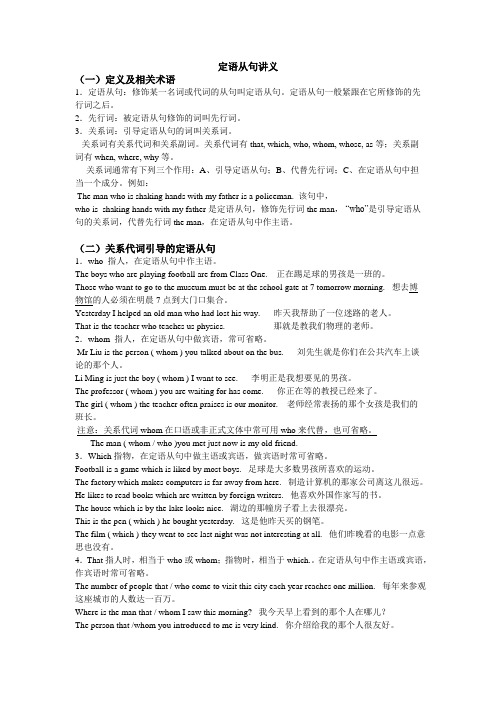
定语从句讲义(一)定义及相关术语1.定语从句:修饰某一名词或代词的从句叫定语从句。
定语从句一般紧跟在它所修饰的先行词之后。
2.先行词:被定语从句修饰的词叫先行词。
3.关系词:引导定语从句的词叫关系词。
关系词有关系代词和关系副词。
关系代词有that, which, who, whom, whose, as等;关系副词有when, where, why等。
关系词通常有下列三个作用:A、引导定语从句;B、代替先行词;C、在定语从句中担当一个成分。
例如:The man who is shaking hands with my father is a policeman. 该句中,who is shaking hands with my father 是定语从句,修饰先行词the man,“who”是引导定语从句的关系词,代替先行词the man,在定语从句中作主语。
(二)关系代词引导的定语从句1.who 指人,在定语从句中作主语。
The boys who are playing football are from Class One. 正在踢足球的男孩是一班的。
Those who want to go to the museum must be at the school gate at 7 tomorrow morning. 想去博物馆的人必须在明晨7点到大门口集合。
Yesterday I helped an old man who had lost his way. 昨天我帮助了一位迷路的老人。
That is the teacher who teaches us physics. 那就是教我们物理的老师。
2.whom 指人,在定语从句中做宾语,常可省略。
Mr Liu is the person ( whom ) you talked about on the bus. 刘先生就是你们在公共汽车上谈论的那个人。
河南专升本最新英语语法课堂讲义

第一讲虚拟语气课堂讲义1.虚拟语气存在于if条件句中和一些固定结构中。
2.虚拟语气总是与动词过去的某种时态形影不离。
一般过去时 did过去完成时 had done had been done过去进行时 was/were doing过去将来时 would/should do过去将来完成时would /should have done过去将来进行时 would/should be doing---- would/should do3. 虚拟语气是通过谓语动词的变化来实现的.If only I had been to Paris last year第一节if条件句中的虚拟语气一、表示对将来过去现在的虚拟If he invites me tomorrow,I will go to his party.(强调行为在将来发生的可能性大---真实条件句)If he invited me tomorrow,I would go to his party(强调行为在将来发生的可能性小----虚拟条件句)虚拟条件句1,表示对将来的虚拟:a. If he invited me tomorrow,I would go to his party.万一b. If he should invite me tomorrow,I would go to his party.万一c. If he were to invite me tomorrow,I would go to his party.Were he to invite me tomorrow,I would go to his party.was 不会出现在虚拟语气的正确选项中(强调行为在将来发生的可能性小)真实:He will probably not invite me tomorrow, so I will not go to his party.小结:was、may不会出现在虚拟语气中。
专升本英语语法讲义 1.5
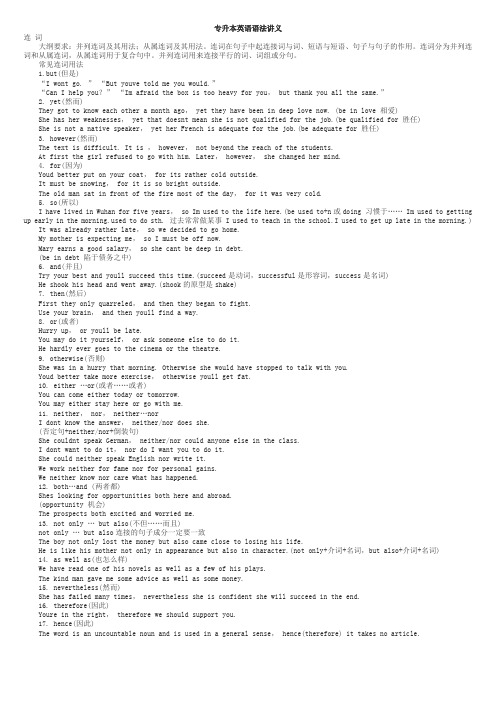
专升本英语语法讲义连词大纲要求:并列连词及其用法;从属连词及其用法。
连词在句子中起连接词与词、短语与短语、句子与句子的作用。
连词分为并列连词和从属连词,从属连词用于复合句中。
并列连词用来连接平行的词、词组或分句。
常见连词用法1.but(但是)“I wont go. ”“But youve told me you would.”“Can I help you?”“Im afraid the box is too heavy for you, but thank you all the same.”2. yet(然而)They got to know each other a month ago, yet they have been in deep love now. (be in love 相爱)She has her weaknesses, yet that doesnt mean she is not qualified for the job.(be qualified for 胜任)She is not a native speaker, yet her French is adequate for the job.(be adequate for 胜任)3. however(然而)The text is difficult. It is , however, not beyond the reach of the students.At first the girl refused to go with him. Later, however, she changed her mind.4. for(因为)Youd better put on your coat, for its rather cold outside.It must be snowing, for it is so bright outside.The old man sat in front of the fire most of the day, for it was very cold.5. so(所以)I have lived in Wuhan for five years, so Im used to the life here.(be used to+n或doing 习惯于…… Im used to getting up early in the ed to do sth. 过去常常做某事 I used to teach in the school.I used to get up late in the morning.) It was already rather late, so we decided to go home.My mother is expecting me, so I must be off now.Mary earns a good salary, so she cant be deep in debt.(be in debt 陷于债务之中)6. and(并且)Try your best and youll succeed this time.(succeed是动词,successful是形容词,success是名词)He shook his head and went away.(shook的原型是shake)7. then(然后)First they only quarreled, and then they began to fight.Use your brain, and then youll find a way.8. or(或者)Hurry up, or youll be late.You may do it yourself, or ask someone else to do it.He hardly ever goes to the cinema or the theatre.9. otherwise(否则)She was in a hurry that morning. Otherwise she would have stopped to talk with you.Youd better take more exercise, otherwise youll get fat.10. either …or(或者……或者)You can come either today or tomorrow.You may either stay here or go with me.11. neither, nor, neither…norI dont know the answer, neither/nor does she.(否定句+neither/nor+倒装句)She couldnt speak German, neither/nor could anyone else in the class.I dont want to do it, nor do I want you to do it.She could neither speak English nor write it.We work neither for fame nor for personal gains.We neither know nor care what has happened.12. both…and (两者都)Shes looking for opportunities both here and abroad.(opportunity 机会)The prospects both excited and worried me.13. not only … but also(不但……而且)not only … but also连接的句子成分一定要一致The boy not only lost the money but also came close to losing his life.He is like his mother not only in appearance but also in character.(not only+介词+名词,but also+介词+名词)14. as well as(也怎么样)We have read one of his novels as well as a few of his plays.The kind man gave me some advice as well as some money.15. nevertheless(然而)She has failed many times, nevertheless she is confident she will succeed in the end.16. therefore(因此)Youre in the right, therefore we should support you.17. hence(因此)The word is an uncountable noun and is used in a general sense, hence(therefore) it takes no article.。
江西省专升本英语辅导讲义
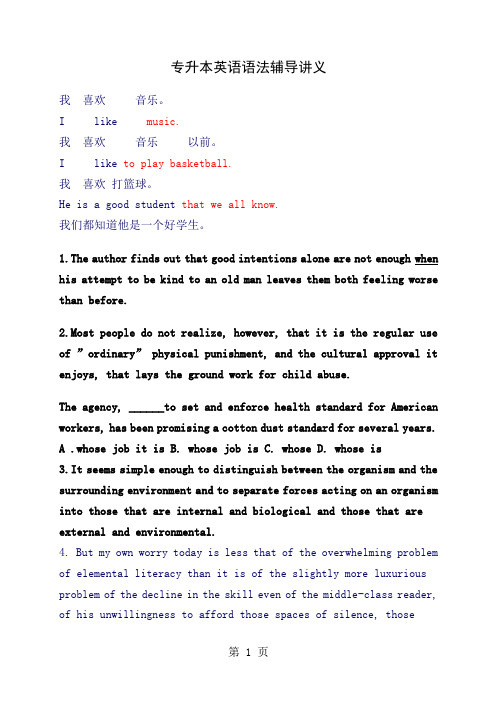
专升本英语语法辅导讲义我喜欢音乐。
I like music.我喜欢音乐以前。
I like to play basketball.我喜欢打篮球。
He is a good student that we all know.我们都知道他是一个好学生。
1.The author finds out that good intentions alone are not enough when his attempt to be kind to an old man leaves them both feeling worse than before.2.Most people do not realize, however, that it is the regular use of ”ordinary” physical punishment, and the cultural approval it enjoys, that lays the ground work for child abuse.The agency, ______to set and enforce health standard for American workers, has been promising a cotton dust standard for several years.A .whose job it is B. whose job is C. whose D. whose is3.It seems simple enough to distinguish between the organism and the surrounding environment and to separate forces acting on an organism into those that are internal and biological and those that are external and environmental.4. But my own worry today is less that of the overwhelming problem of elemental literacy than it is of the slightly more luxurious problem of the decline in the skill even of the middle-class reader, of his unwillingness to afford those spaces of silence, thoseluxuries of domesticity and time and concentration, that surround the image of the classic act of reading.第一章、时态和语态<主要是指谓语动词>一.时态⒈现在时(1)一般现在时He likes music.(2)现在进行时He is doing the housework.(3)现在完成时He has finished the work.(4)现在完成进行时He has been studying English for six years.注意:The house has been in bad repair since he lived in it.The house has been in bad repair since he moved out .The house has been in bad repair since he has lived in it.I haven’t eaten snails since I was a student at Indiana University.I haven’t eaten snails since I left Indiana University.I haven’t eaten snails since I have been a student at Indiana.⒉过去时(1)一般过去时He watched TV last night(2)过去进行时He was doing his homework at this time yesterday.(3)过去完成时<过去的过去>He had worked for six years before Marry joined the Army.(4)过去完成进行时He had been working for the factory before Marry joined the Army.⒊将来时(1)一般将来时I will study English next week.I shall study English next week.I am going to study English next week.I am about to study English next week.I am to study English next week.区别:will 和 be going to, be about to, be to 的区别如:If the metal is heated, it will expand.I am going to study English next week.I am about to study English next week.I am to study English next week.区别:be going to , be about to ,和be to 的区别如:Look , so many black clouds , it is going to rain.当有预先征兆的时候我们应该用be going to.(2)将来进行时I will be studying English at six o'clock tomorrow.如果是将来的一个具体时间我们可以用将来进行时.(3)过去将来时He said,"I will study English next week."He said that he would study English the next week.(4)将来完成时We will have finished the work by next year.43. By the end of last month, we ______ on this project for more than6 weeks.(09)A) have worked B) had worked C) are working D) will work68. By the time you get there this afternoon, the film ____.(06\07)A) is to start B) is starting C) will start D) will have started44. We plan to finish the work on the 15th of next month. By then, we ___ for ten weeks.(05)A) are working B) have been worked C) were working D) will have worked60. By the end of this year, it _____ 16 years since the emergence of the World Wide Web as an electronic–publishing vehicle.(05) A) has been B) will havebeen C) will be D) had been特例:⒈He is always speaking to his mother like this.当表示一种埋怨和责备语气的时候用现在进行代替一般现在时.二.语态主动语态I wrote a letter yesterday.I will write the book.被动语态The letter was written by me yesterday.The book will be written by me.56. The professor was so popular that he _____ with enthusiasm.(07)A) always listened to B) always was listenedC) was always listened D) was always listened to特例:⒈ I made him cryHe was made to cry by me.⒉ I heard him sing the song yesterday.He was heard to sing the song by me yesterday.第二章、句子结构主谓宾定状补表同位I like music.<主谓宾>I gave you a bike.<双宾>I have a r ed pen.<定语>He studies hard.<程度状语>程度状语He studies english in the afternoon.<时间状语>时间状语He sings in the classroom<地点状语>He is late because he is ill.<原因状语>He goes to school by bus.<方式状语>If you come here he will come too.<条件状语>备注:在时间状语从句和条件状语从句中从句不能用将来时He came here to look after me.<目的状语>He got up so early that he caught the bus.<结果状语>He got up so early that he could catch the bus.<目的状语>He came here with a smile.<伴随状语>The Army walked in the street while people were dancing.<伴随状语> Although he is a little boy, he knows a lot. (让步状语)补语<宾补,主补>I call you Tom .<宾补>I find english easy.<宾补>sb. sbadj.You are called Tom.<主补>I am a student.<表语>I am excited.< 系表结构>同位语<同位主语,同位宾语>You two are foolish.<同位主语>I beat you two.<同位宾语>第三章、主从复合句<必须满足:⒈只有一个句号⒉主句和从句之间必须要有连接词,连接词有两个功能,一是起到连接从句,整体作为整个主句的一个成分,二是连接词本身在从句中单独也做一个成分⒊从句必须用正常语序>主语从句What your name is is not known.<主语从句>That he came here made us happy.<主语从句>宾语从句I do not know what your name is.<宾语从句>I find (that) English is easy.<宾语从句>52. The meeting was put off until next week, which was exactly ______we wanted.(06)A) it B) which C)that D) what同位主语从句The news that he will come here makes us happy.<同位主语从句>The result whether the team has won the game is not known.<同位主语从句>76. We have to face the fact ____ new computer viruses may appearat any time and it can spread across computers in a very rapid speed.(09)A) that B)it C) which D) what43. All _____ the people want are lasting peace and social progress.(05)A) what B) such C) those D) which50. The United Nations expressed the hope ___ the two sides should soon stop fighting in the area.(05)A) which B) that C) what D) when表语从句Money is what I want.<表语从句>49. What the doctor advises me to do is ____ I must keep talking a well-balanced diet and regular exercises.(09)A) that B)whether C)which D) what名词性从句的特例<whether 和 if(是否)的区别>⒈The question is whether the film is worth seeing <在表语从句中只能用whether不用if>⒉The news whether our team has won the watch is unknown.<在同位语从句中只能用whether>⒊Whether we will attend the meeting is unknown.<在主语从句中只能用whether>⒋It is unknown whether <if>we will attend the meeting.<当它转换成形式主语时两者都可以用>⒌It all depends on whether we will support him.<在介词后面只能用whether>⒍He does not know whether to stay or not.<如果是直接接动词不定式只能用whether>⒎He does not know whether (if) he should stay or not.<如果引导的是这种宾语从句两者皆可以用>⒏He did not know whether or not she has been ready.<如果是直接跟or not 只能用whether>⒐I wonder if /whether the news is true.<如果引导的是这种宾语从句两者皆可以用>⒑He was not sure if/whether it is right or wrong.<参见第四种>⒒I do not care if it does not rain.<如果宾语从句是否定句习惯上用if>状语从句If you come here he will come too.<条件状语从句>备注:在时间状语从句和条件状语从句中从句不能用将来时He is late because he is ill.<原因状语从句>He got up so early that he caught the bus.<结果状语从句>He got up so early that he could catch the bus.<目的状语从句>The Army walked in the street while people were dancing.<伴随状语从句>I came here when you went out.<时间状语从句>I will go where our country most needs me.<地点状语从句>I did the thing as you said.<方式状语从句>44. He didn’t realize he had left the files in his customer’s office______ he went back to the company.(09)A) if B) until C) unless D) since67. He will go abroad to further his study next year _________ hegets a scholarship or enough money. (09)A) if B)so C)till D) although73. ____ she joined the company only a year ago, she’s already beenpromoted twice.(09)A) Because B) If C)Although D) When42. John frequently attempts to escape being fined whenever he ____traffic regulations.(08)A) breaks B) is breaking C) will breakD) broke72._____we entered the hall, an attendant came up and offered us a list.(08)A) As long as B) As far as C) As well as D)As soon as78._______John is in rather poor health, he can hardly resist catching colds.(08)A) Although B) Since C) After D) opposed51. I ____ my breakfast when the morning post came.(07)A) was having B) had been having C)had D) am having62. ______ we were given the right address, we found her house easily.(06\07)A) Since B) Although C)If D) So54. Most of the graduating students have decided to go ______ they are most needed.(06)A) where B)which C) what D) how补语从句I put the book where it was.<状语从句,也可理解为补语从句>A big room定语从句先行词关系词<包括关系代词,关系副词>关系代词:which that who whose whom as关系副词:where when why限制性定语从句This is the house (which) luxun lived in.=This is the house (that) luxun lived in.=This is the house in which luxun once lived. This is the house where luxun once lived.<瞻前顾后>I saved the boy whose mother is my teacher.He is the man who saved the boy yesterday.He is the boy (whom) the man saved yesterday.I will never forget the day when I joined the Army.=I will never forget the day on which I joined the Army.This is the house where luxun once lived.I do not know the reason why he is late.45. I don’t know _____ will ma ke the final decision for our summer trip.(09)A) what B) which C)whom D) who52. In his speech he advice to____ was interested in the field of computer science.(09)A).that B).whoever C) whom D) whose79. Each ARS scientist ____ proposal was accepted will receive $80000 for two years of high-priority research.(09)A) who B) whose C)which D) what48. As to the election, please give your vote to ____ you think you can trust.(08)A) who B) whom C) one D) whoeveras⒈He is as(so) great a painter as ever lived.(as…as,so…as)⒉I bought such a watch as is shown on TV.<当such a 修饰先行词时用as>61. We hope that such a book _____ is helpful to our research work is on sale.(05)A) that B) as C) which D) till⒊I bought the same watch as (that)is shown on TV<当the same 修饰先行词时用as>⒋He is a good student, which (as) we all know.< 当在非限制性定语从句中代替前面的一句话时用as或which 但一旦提前只能用as>例如:As we all know , he is a good student.非限制性定语从句I will go to Beijing , where there is a meeting.That 不能用于非限制定语从句He is a good student, which (as) we all know只有非限制性定语从句关系代词which\as才可以代替前面一句话59. _____ I explained on the phone, your request will be considered at the next meeting.(09)A) As B)That C) Which D) What61. The mountains also prove to be a tourist attraction as some of the mountains experience alpine (高山的) conditions, _____ leads to ski resorts.(09)A) who B) which C) it D) that69. He was looking forward to the time _______ he would have to attend the interview.(06)A) where B)that C) why D) when定语从句的特例特例:一.如果先行词是all, sth, nothing, anything 等不定代词时或者先行词被only,最高级,序数词所修饰时,只能用that,不能用which 例如:He told us all that he knew.He told us sth that he knew.He bought the first watch that was produced by the factory.He bought the most expensive watch that was produced by the factory.二.如果先行词又有人又有物只能用that例如:She spent the whole evening talking about the things and persons that none of us has ever heard of.三.that 在下面情况下做了关系副词例如:I do not like the way that you speak to her.在这里that 可以换成in which 或者不填四、but 在定语从句中的用法(只能用于限制性定语从句,且必须同具有否定意义的主句连用,其先行词可以是人,也可以是物,but在意义上等于“that…not”,“who…not ”,“which…not”)There was not a single student in my class but(who did not) learnta lot from him.我班上每一个学生都从他那里学到很多东西。
专升本英语语法讲义
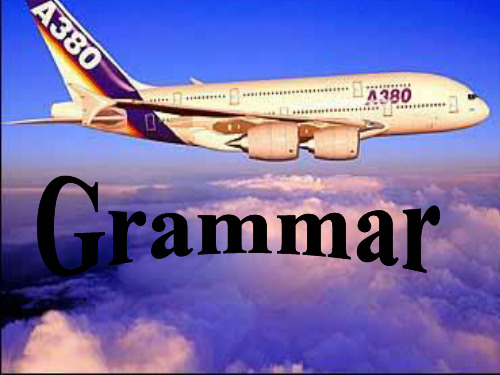
Yes, they have. No, they haven’t.
2.现在完成时动词可以表示开始于过去持续到现在(也许还会继续进行下去)的动作或状 态.例如:
1)I have studied English since 1975. 我从一九七五年起就学习英语. 2)They have been in Beijing since 1949. 他们从一九四九年起就(住)在北京. 3)He has lived here for two years. 他住在这儿已经两年了. 4)He has been ill for ten days.他病了十天了. 注:come, go, leave, arrive, join, die, bury, 和marry等动词所表示的动作是一时的,
*His father has died for five months. 可以说:He has been in Beijing for seven years.
He has been away from Beijing for two years.
He has been in the army for three years. His father has been dead for five months. 或: It is seven years since he came to Beijing.
不能延续的,故不能与for …, since …等开头的表示一段时间的状语连用. 如不能说:*He has come to Beijing for seven years.
专升本英语从句语法知识点精讲
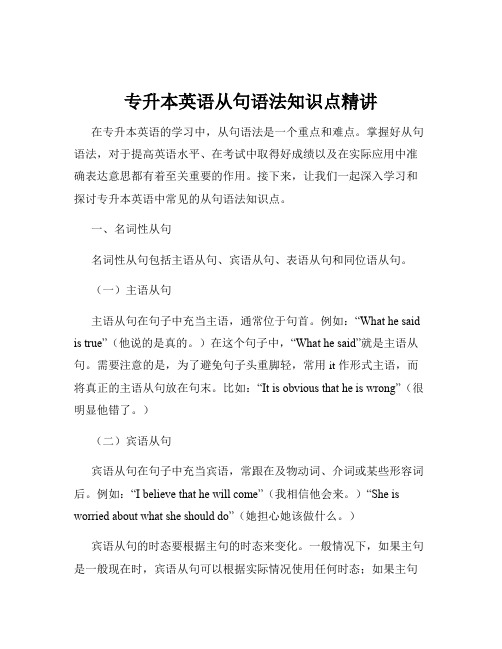
专升本英语从句语法知识点精讲在专升本英语的学习中,从句语法是一个重点和难点。
掌握好从句语法,对于提高英语水平、在考试中取得好成绩以及在实际应用中准确表达意思都有着至关重要的作用。
接下来,让我们一起深入学习和探讨专升本英语中常见的从句语法知识点。
一、名词性从句名词性从句包括主语从句、宾语从句、表语从句和同位语从句。
(一)主语从句主语从句在句子中充当主语,通常位于句首。
例如:“What he said is true”(他说的是真的。
)在这个句子中,“What he said”就是主语从句。
需要注意的是,为了避免句子头重脚轻,常用 it 作形式主语,而将真正的主语从句放在句末。
比如:“It is obvious that he is wrong”(很明显他错了。
)(二)宾语从句宾语从句在句子中充当宾语,常跟在及物动词、介词或某些形容词后。
例如:“I believe that he will come”(我相信他会来。
)“She is worried about what she should do”(她担心她该做什么。
)宾语从句的时态要根据主句的时态来变化。
一般情况下,如果主句是一般现在时,宾语从句可以根据实际情况使用任何时态;如果主句是一般过去时,宾语从句则要用相应的过去时态。
但如果宾语从句表示的是客观真理、自然现象等,无论主句是什么时态,从句都要用一般现在时。
(三)表语从句表语从句在句子中充当表语,位于系动词之后。
例如:“The problem is whether we can finish the work on time”(问题是我们能否按时完成工作。
)(四)同位语从句同位语从句用于解释说明前面的名词,通常与先行词在内容上等同。
常见的先行词有 idea, news, fact, belief 等。
例如:“The news that he won the game is exciting”(他赢得比赛的消息令人兴奋。
